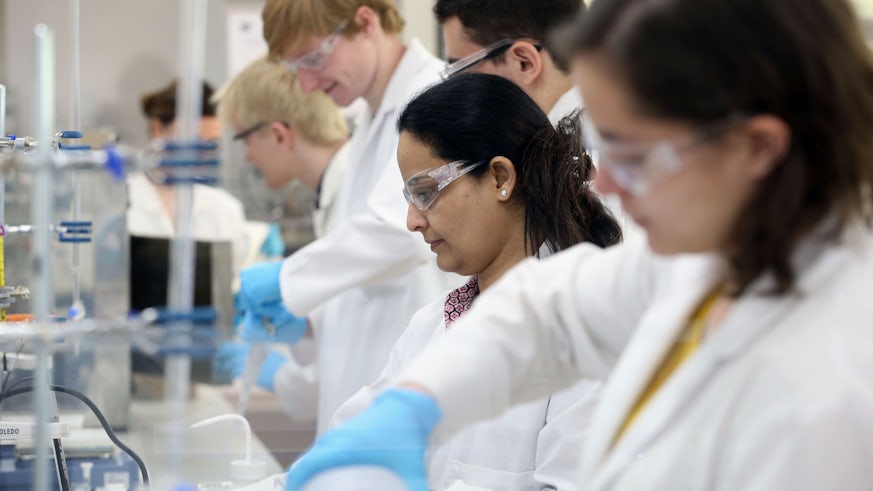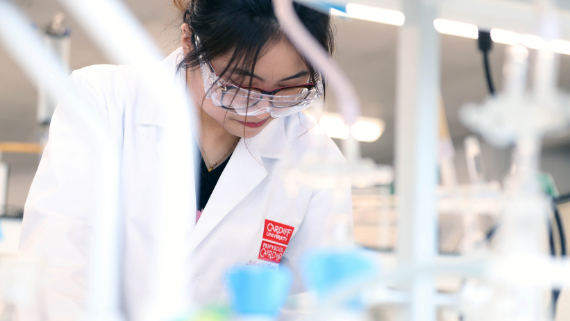Award highlights chemistry’s key role in environmental solutions
25 March 2021

Professor Graham Hutchings, of Cardiff’s School of Chemistry, has been awarded the 2021 Michel Boudart Award in Fundamental Catalysis for his ‘ground-breaking’ work in the field of gold and selective oxidation catalysis, which helps to tackle key environmental issues.
The award recognises Professor Hutchings for taking fundamental concepts in catalysis, that at first appear to be quite academic, and developing them to have applications which help clean up the environment and underpin a sustainable future for us all.
This is particularly true when we understand his contribution to the replacement of the mercury catalyst used for the large-scale production of one of the world’s most used plastics, polyvinyl chloride (PVC). His research has developed a more benign alternative based on gold.
As a result of Professor Hutchings’ pioneering work, a gold catalyst is now being produced at a purpose-built factory in China, by global chemicals company Johnson Matthey, to catalyse the production of vinyl chloride – the first time in over 50 years that a complete overhaul in catalyst formulation has been implemented to produce a commodity chemical!
This work stems from our Cardiff Catalysis Institute, where we are improving the understanding of catalysis, developing new catalytic processes with industry, and promoting the use of catalysis as a sustainable 21st century technology.
Valuing the important implications that catalysis research has on our modern world, Cardiff University has invested in new research infrastructure via our new Translational Research Hub. This is part of a wider development plan to build our £300M Innovation Campus, where research will combine with industry to produce real-world solutions.
Head of Cardiff School of Chemistry, Damien Murphy, told us:
"Catalysis has been a strength at Cardiff for many years, it is a continually developing science and we are proud that leaders such as Graham are able to make a real impact on industrial technology.
It's great that the worldwide catalysis community also recognise Cardiff as a major centre in this area by selecting Graham to receive this prestigious award."
Professor Hutchings’ combination of industrial and academic experiences in both the UK and across the world have given him a research perspective which enables him to engage with complex catalysis problems, study them with ingenuity, and provide practical solutions through advances in basic science.
The European Federation of Catalysis Societies (EFCATS) and the North American Catalysis Society (NACS) announced the award.
In doing so, they cited Professor Hutchings contributions to the field as being diverse, impactful, and highly appreciated and as having kept the UK at the very forefront of catalysis research over the years.
On receiving the award Professor Hutchings said:
"Catalysis is a fascinating area of science that places chemistry at the interface between fundamental ideas and real-world applications and I have always been excited to work with colleagues from across the world to tackle the challenges it presents.
It's a great honour to receive this year's Boudart award which recognises the creative and dedicated work of the team I have been able to build at Cardiff”.
The Michel Boudart Award “recognises and encourages individual contributions to the explanation of the mechanism and active sites involved in catalytic phenomena and to the development of new methods or concepts that advance the understanding and/or practice of heterogeneous catalysis” (EFCATS).
We look forward to the many more innovations and sustainable impact our Cardiff Catalysis Institute will have over the coming years.
For details of the award, head to: https://efcats.org/Awards/Graham+Hutchings.html
Share this story
Full details of our BSc and MChem courses, including how to apply.

